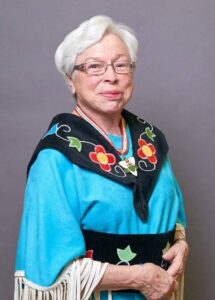Remembering the life and legacy of Elder Geraldine Robertson

By Colin Graf
AAMJIWNAANG FIRST NATION— Elder Geraldine Robertson, tireless advocate for survivors of the Canadian residential school system and recipient of the Order of Ontario, is fondly remembered as she makes her way into the Spirit World.
“[Her work]in educating settler people about the reality of residential schools, and her generosity in sharing her story changed our hearts and the hearts of all who met her,” writes Rev. Kate Crawford of Huron Shores United Church in Grand Bend, Ont., in the online book of condolence.
Crawford’s congregation nominated Elder Robertson for the Order of Ontario, which she received in 2017.
Whether speaking to small groups or hundreds, or leading a blanket exercise teaching about survivors’ experiences, Elder Robertson always impressed audiences with “her intelligence combined with the strength in her spirit which comes from her own personal journey,” Crawford said at the time of the award.
When she told her personal story, she was not interested in assigning blame, but always made it clear that “I need you to know what happened to me,” Crawford recalls.
Elder Robertson spent much of the last 20 years speaking about her experiences from Ontario to British Columbia, most commonly with the support of the United Church of Canada (UCC). The Order of Ontario citation from the government describes Elder Robertson as “an educator and advocate for residential school survivors” who has encouraged other survivors “to open up and strive toward healing, educated countless people on the intergenerational legacy of residential schools, and helped advocate for compensation for survivors.”
Crawford and her parishioners submitted Elder Robertson’s name for the award because she has “contributed so much to reconciliation in the province and actually across the nation.”
They were proud to nominate her as “someone of such moral strength and personal courage as an example for all Ontarians, so we can walk the same walk as Geraldine; so she can be a role model to us,” said Crawford.
The most difficult part of the nomination process was convincing the modest Elder to allow her name to be brought forward, according to Crawford.
“I just never thought that the average, ordinary person would get an award such as the Order of Ontario,” said Elder Robertson at the time of her nomination when she received the surprising news.
“[It] was sort of a vindication that I’ve been on the right track. It’s not something I expected; it’s a nice surprise,” she said of the award. “I like to keep a low profile; I don’t like to draw attention to myself. I think it is worthy in the sense that it draws attention to the topic of residential schools.”
Witnessing the problems many of her peers had in parenting, Elder Robertson, a mother herself at the time, started speaking publicly about her experiences at the Mohawk Institute in Brantford to help them.
“Their frame of reference for parenting was what they had learned at residential schools; a lot of violence,” she remembers, noting that was why it was hard for survivors to be good parents.
Her first speech, delivered in 1995, was to her Chief and Council. Elder Robertson felt programs in Aamjiwnaang, then known as Chippewas of Sarnia, were not helping people heal and overcome the intergenerational trauma, and her appeals helped bring programs such as parenting classes, baby wellness programs, and anti-violence workshops to the community.
Since then, she has travelled much of Canada in her work, and has visited many elementary and secondary schools across southwestern Ontario. Elder Robertson has been featured in the documentary “We Are Still Here,” about the experiences of survivors from her area, and her children have been part of the follow-up film, “Aftershock”, documenting the effects of residential schools through subsequent generations.
Elder Robertson was “central” in the planning and leadership of workshops held across Canada with survivors and pastoral leaders of First Nation congregations of the UCC from 2007 to 2010, writes Cecile Fausak, a self-described “United Church colleague on the journey of reconciliation,” in the condolence book.
She writes that Elder Robertson was “a highly valued member” of the (UCC) Residential Schools Steering Committee for over six years who displayed “grace, courage, stamina, wisdom, and love.”
“Geraldine had a humble regal presence…[and]…without her, very difficult conversations would not have led to the steps in healing and reconciliation that were taken [by the UCC],” Fausak writes.
Elder Robertson was a “mentor extraordinaire” who continued to do “great works” after retirement, “struggling to get her computer to work” as she read applications to the Church’s Justice and Reconciliation Grants committee.
Geraldine Robertson leaves her husband Robert Robertson of 65 years, her children Dan, Bill (Petra), Linda (John), John (Marjorie), Kathleen (Glenn), and Maureen (Tom). She is also survived by grandchildren Robert Jr., Christine, Jennifer (Robert), Justin, Kirsten, Heather (Dylan), Avery, eight great-grandchildren, and her brother Ted Maness (Alverna).

